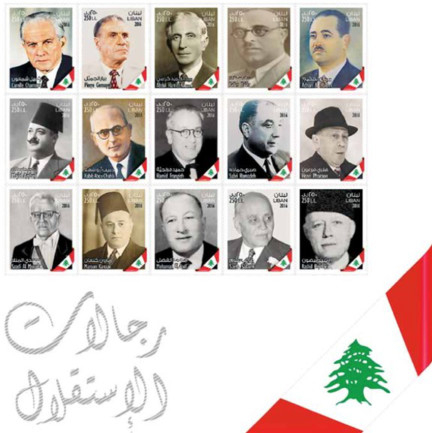
Beirut: LibanPost, the private entity associated with the Ministry of Telecommunications, issued 15 stamps to honor individuals who contributed to the country’s independence.
Although previous stamps included the first head-of-state (Bisharah Al Khoury) and first prime minister (Riad Al Solh), the latest batch included lesser known figures who, nevertheless, ensured that the nascent republic lived up to expectations.
Among these were Saeb Salam, the father of current Prime Minister Tamam Salam [and the man often credited for designing the national flag in his Rashayah prison cell], Sabri Hamadih, Camille Chamoun, Abdul Hamid Karami, Habib Abu Shahla, Majid Arslan and Henri Pharaon.
Pierre Gemayel, the founder of the Phalange Party, was also included even if the choice was controversial because of the role he played in the civil war. Other prominent figures, men like Rashid Baydun, Hamid Franjieh and Salim Taklah, whose names most Lebanese citizens are unfamiliar with, graced the postal issues in what may well be a long-overdue civics lesson.
As Lebanon prepares to celebrate its 73rd Independence anniversary on November 22, 2016, the commemorative postage stamps was an occasion to assemble the families and descendants of the 15 figures and, simultaneously, prepare for the important date after a two-and-a-half year vacancy at the head of the state. On Tuesday, Beirut will hold a military parade in the Downtown area in the presence of newly elected President Michel Aoun.
For the occasion, LibanPost gathered a large crowd at its headquarters in Beirut’s Riad Al Solh Square, where an imposing statue of the first prime minister stands watch in front of the Grand Serail [Government House].
Attendees signed a Lebanese flag in what turned out to be an emotional event as several offspring of notable figures were present, including Minister of Tourism Michel Pharaon, former deputy Samir Franjieh, and the head of the National Liberal Party head, deputy Dory Chamoun.
The son of the second president had the last word when Chamoun chimed that he hoped LibanPost would “also honor the ladies who did a lot for Lebanon and who were forgotten this time.”
He probably had in mind such figures as Anbara Salam Al Khalidi, Saeb Salam’s formidable sister who was a genuine feminist and who contributed to the emancipation of Arab women far more than many knew, and May Ziade, a Lebanese-Palestinian pioneer of Oriental feminism who maintained a platonic relationship with Khalil Gibran, and whose writings inspired an entire generation to cherish everyone.












